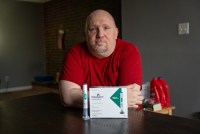Latest KFF Health News Stories
Experts: US Hospitals Prone to Cyberattacks Like One That Hurt Patient Care at Ascension
Clinicians working for Ascension hospitals in multiple states described harrowing lapses, including delayed or lost lab results, medication errors, and an absence of routine safety checks to prevent potentially fatal mistakes.
Indiana Weighs Hospital Monopoly as Officials Elsewhere Scrutinize Similar Deals
If Indiana officials approve a proposed hospital merger in western Indiana in the coming months, the state will have its first hospital monopoly created by a “Certificate of Public Advantage.” Other such deals have resulted in government reports documenting diminished care in Tennessee and North Carolina.
Investigan si los armadillos son responsables de la propagación de la lepra en Florida
La región central de Florida es un foco crítico de esta antigua enfermedad, lo que desconcierta a los científicos que están analizando el fenómeno.
The Case of the Armadillo: Is It Spreading Leprosy in Florida?
A single Central Florida county reported 13% of all U.S. leprosy cases in 2020. Researchers have teamed up to investigate whether armadillos are passing the bacteria that cause the disease to humans — which is especially concerning as the animals expand their range farther north.
FDA Said It Never Inspected Dental Lab That Made Controversial AGGA Device
Johns Dental Laboratories stopped making the Anterior Growth Guidance Appliance last year after a KFF Health News-CBS News investigation into allegations of patient harm. The company had “never” reported any complaints about its products to the FDA, according to the agency.
Why Opioid Settlement Money Is Paying County Employees’ Salaries
More than $4.3 billion in opioid settlement money has landed in the hands of city, county and state officials to date — with billions more on the way. But instead of using the cash to add desperately needed treatment, recovery and prevention services, some places are using it to replace existing funding. Local officials say […]
Swap Funds or Add Services? Use of Opioid Settlement Cash Sparks Strong Disagreements
The national opioid settlements don’t prohibit using money for initiatives already supported by other means, but doing so could dilute the impact.
What the Health? From KFF Health News: Arizona Turns Back the Clock on Abortion Access
A week after the Florida Supreme Court said the state could enforce an abortion ban passed in 2023, the Arizona Supreme Court ruled that state could enforce a near-total ban passed in 1864 — over a half-century before Arizona became a state. The move further scrambled the abortion issue for Republicans and posed an immediate quandary for former President Donald Trump, who has been seeking an elusive middle ground in the polarized debate. Alice Miranda Ollstein of Politico, Rachel Cohrs Zhang of Stat, and Rachel Roubein of The Washington Post join KFF Health News’ Julie Rovner to discuss these stories and more. Also this week, Rovner interviews KFF Health News’ Molly Castle Work, who reported and wrote the latest KFF Health News-NPR “Bill of the Month” feature, about an air-ambulance ride for an infant with RSV that his insurer deemed not medically necessary.
For-Profit Companies Open Psychiatric Hospitals in Areas Clamoring for Care
State institutions and community hospitals have closed inpatient mental health units, often citing staffing and financial challenges. Now, for-profit companies are opening psychiatric hospitals to fill the void.
Early Detection May Help Kentucky Tamp Down Its Lung Cancer Crisis
After a decade of work, a Kentucky program launched to diagnose lung cancer earlier is beginning to change the prognosis for residents by catching tumors when they’re more treatable.
States Target Health Insurers’ ‘Prior Authorization’ Red Tape
Doctors, patients, and hospitals have railed for years about the prior authorization processes that health insurers use to decide whether they’ll pay for patients’ drugs or medical procedures. The Biden administration announced a crackdown in January, but some state lawmakers are looking to go further.
Florida Foster Kids Are Given Powerful Medications, but Feds Find State Oversight Lacking
A report by the U.S. Department of Health and Human Services raises troubling questions about the use of powerful medications within Florida’s child welfare system and the risk of overdoses or dangerous side effects if children are given the wrong combination of drugs.
Officials Agree: Use Settlement Funds to Curb Youth Addiction. But the ‘How’ Gets Hairy.
Parents, educators, and elected officials agree that investing in school-based prevention efforts could help curb the rising rate of youth drug overdoses. The well-known D.A.R.E. program is one likely choice, but its effectiveness is in question.
Abortion Bans Fuel a Rise in High-Risk Patients Heading to Illinois Hospitals
High-risk patients from states that heavily restrict abortion are coming to hospitals in states such as Illinois that protect abortion rights. The journey can mean more medical risks and higher bills.
‘Like a Russian Roulette’: US Military Firefighters Grapple With Unknowns of PFAS Exposure
Federal research linking “forever chemicals” to testicular cancer confirms what U.S. military personnel long suspected. But as they seek testing for PFAS exposure, many wonder what to do with the results. There’s no medical treatment yet.
Artificial Intelligence May Influence Whether You Can Get Pain Medication
To contain the opioid crisis, health and law enforcement agencies have turned to technology to monitor doctor and patient prescription data. Experts have raised questions about how these systems work and worry about their accuracy and potential biases. Some patients and doctors say they’re being unfairly targeted.
Pioneering Study Links Testicular Cancer Among Military Personnel to ‘Forever Chemicals’
The military first documented health concerns surrounding chemicals known as PFAS decades ago yet has continued to use firefighting foam made with them. Despite scores of lawsuits by its personnel and high rates of testicular cancer among troops, it has been slow to investigate a connection.
What One Hospital’s Slow Recovery From a Cyberattack Means for Patients
U.S. hospitals have seen a record number of cyberattacks over the past few years. Getting hacked can cost a hospital millions of dollars, expose patient data, and even jeopardize patient care.
Medicaid: más de medio millón ya han perdido cobertura desde fin de beneficios pandémicos
Hasta ahora, 4 de cada cinco personas que perdieron la cobertura nunca devolvieron la documentación requerida, según un análisis de datos de 11 estados.
As Medicaid Purge Begins, ‘Staggering Numbers’ of Americans Lose Coverage
In what’s known as the Medicaid “unwinding,” states are combing through rolls to decide who stays and who goes. But the overwhelming majority of people who have lost coverage so far were dropped because of technicalities, not because officials determined they are no longer eligible.
























